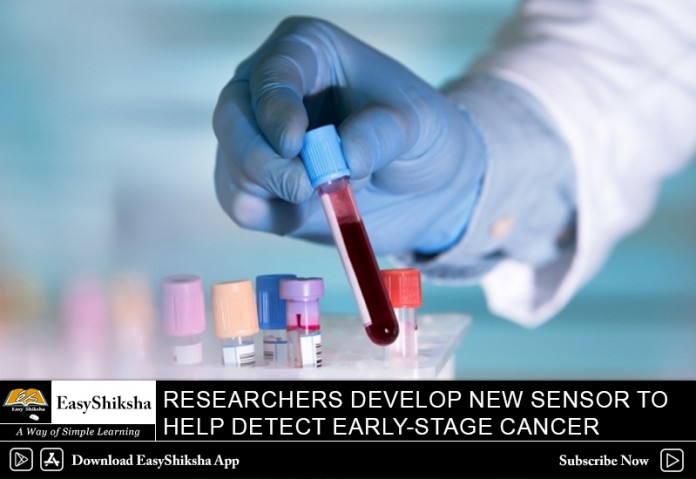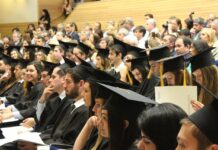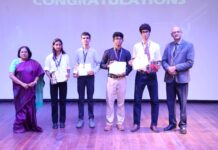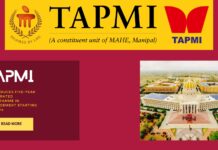‘This sensor can detect biomarkers and single molecules at much lower levels than current blood tests can, and we can get results in several minutes.’
A new device that can detect very low concentrations of cancer markers in blood tests could one day help doctors diagnose cancer at its earliest stages, researchers say.
A group of chemists from UNSW Sydney’s Australian Centre for NanoMedicine (ACN) and biologists from UNSW’s Lowy Cancer Research Centre have created an early version of the first “nanopore blockade sensor” that can analyse disease biomarkers at a rapid, single molecule level.

Important Announcement – EasyShiksha has now started Online Internship Program “Ab India Sikhega Ghar Se”

Cancer biomarkers – or tumour markers – are substances, often proteins, that are produced by the body in response to cancer growth.
UNSW Scientia Professor Justin Gooding, who developed the technology with a team of scientists, said a key approach to reducing deaths from life-threatening cancers was to diagnose cancers as early as possible, when treatments were far more effective.
“Developing ultrasensitive cancer marker sensors is critical because it allows for very early detection after the cancer has occurred but before any symptoms start appearing,” said Professor Gooding, from the School of Chemistry at UNSW Science. “The best way to cure cancer is to detect and diagnose it early. What this sensor can do is detect biomarkers and single molecules at much lower levels than current blood tests can, and we can get results in several minutes.”
The nanopore blockade sensors work by using magnetic particles to capture biomarkers and bring them to one of many small pores drilled through a silicon membrane. If a magnetic nanoparticle has captured the biomarker, it will block the pore. By counting which pores are blocked the biomarkers can be counted, one molecule at a time. Importantly, the device can be used on whole blood samples regularly taken at pathology labs.
Top Courses in Software Engineering
The technology is about five to 10 years away from being available to patients and needs to go through rigorous further research and trials now, said Professor Gooding. “This is a really hot area in cancer research, especially as it could potentially have a substantial impact as an effective means to estimate how effective treatment will be and assess how likely it is for cancer to reoccur.”
The research and development of the sensor is funded by the Australian Research Council through the ARC Centre of Excellence in Convergent Bio-Nano Science and Technology and an ARC Australian Laureate Fellowship.
The device is just one technology that will be presented at the annual International Nanomedicine Conference in Sydney next week (24-26 June).
The Conference, celebrating its 10th year, is hosted by ACN – an interdisciplinary partnership between the UNSW Faculties of Engineering, Science and Medicine, and Children’s Cancer Institute. ACN is dedicated to the prevention, diagnosis and curing of diseases, especially hard to treat diseases.
Empower your team. Lead the industry
Get a subscription to a library of online courses and digital learning tools for your organization with EasyShiksha
Request NowQ. Are EasyShiksha's internships truly free?
Yes, all internships offered by EasyShiksha are completely free of charge.
Q. How can I apply for an internship with EasyShiksha?
You can apply by visiting our website, browsing available internships, and following the application instructions provided.
Q. What types of internships are available through EasyShiksha?
EasyShiksha offers a wide range of internships across technology, business, marketing, healthcare, and more. Opportunities are continuously updated.
Q. Will I receive a certificate upon completing an internship?
Yes, upon successful completion, you will receive a certificate recognizing your participation and achievements.
Q. Are EasyShiksha's internship certificates recognized by universities and employers?
Yes, the certificates are recognized by universities, colleges, and employers worldwide.
Q. Is the download of certificates free or paid?
Access to internships and courses is free, but there is a small fee to download certificates, covering administrative costs.
Q. When can I start the course?
You can choose any course and start immediately without delay.
Q. What are the course and session timings?
These are fully online courses. You can learn at any time and pace. We recommend following a routine, but it depends on your schedule.
Q. What will happen when my course is over?
After completion, you will have lifetime access to the course for future reference.
Q. Can I download the notes and study material?
Yes, you can access and download course materials and have lifetime access for future reference.
Q. What software/tools would be needed for the course?
All necessary software/tools will be shared during the training as needed.
Q. I’m unable to make a payment. What should I do?
Try using a different card or account. If the problem persists, email us at info@easyshiksha.com.
Q. Do I get the certificate in hard copy?
No, only a soft copy is provided, which can be downloaded and printed if required.
Q. The payment got deducted but shows “failed”. What to do?
Technical errors may cause this. The deducted amount will be returned to your account in 7-10 working days.
Q. Payment was successful but dashboard shows ‘Buy Now’?
Sometimes payment reflection is delayed. If it takes longer than 30 minutes, email info@easyshiksha.com with the payment screenshot.
Q. What is the refund policy?
If you face technical issues, you can request a refund. No refunds are issued once the certificate has been generated.
Q. Can I enroll in a single course?
Yes, select the course of interest, fill in the details, make payment, and start learning. You will also earn a certificate.
Q. My questions are not listed above. I need further help.
Contact us at info@easyshiksha.com for further assistance.
ALSO READ: Aisect-partners-with-microfocus-hpe-to-train-over-500-students
Get Course: Android-Apps-Development







































































